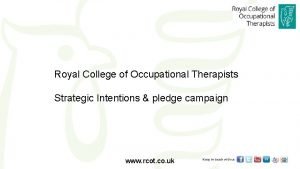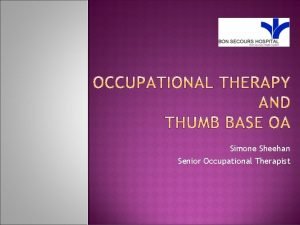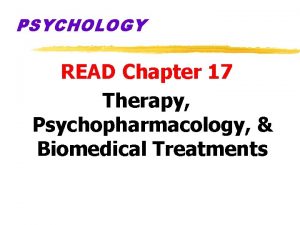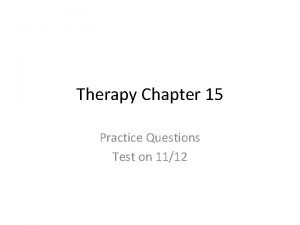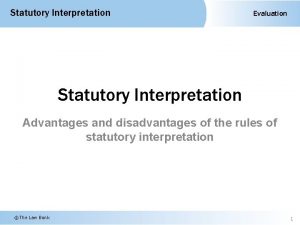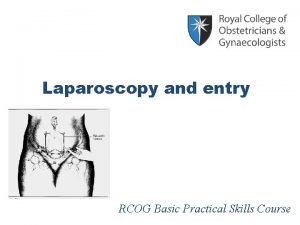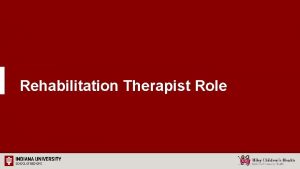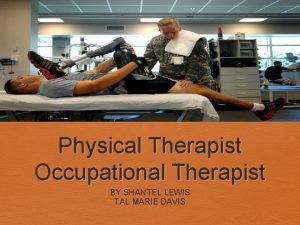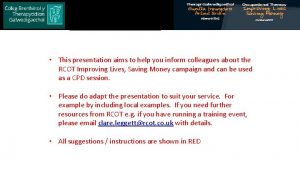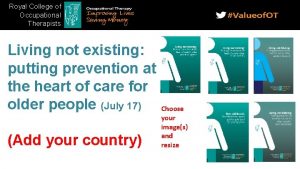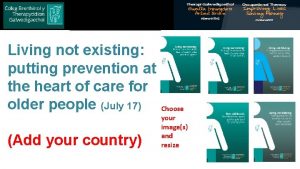Royal College of Occupational Therapists Therapist s Key








- Slides: 8

Royal College of Occupational Therapists Therapist s Key Messages and Influencing Please use the accompanying notes in the workbook when completing the Group CPD session

Royal College of Occupational Therapists Therapist s Learning outcomes • To develop key messages to use with managers and stakeholders and adapt them for the public and media • To effectively communicate key messages within and about your service • Generate actions to get involved in the Occupational therapy: improving lives, saving money campaign to promote your service and new initiatives. • • To gain experience of articulating key messages to others To apply the skills and knowledge gained from practicing your key messages within the group session with you external stakeholders Page 2

Royal College of Occupational Therapists Therapist s Locus of Control Outside of my control Within my control What is within my sphere of influence? Page 3

Royal College of Occupational Therapists Therapist s Key to influencing Don’t use jargon – use occupational therapy Prepare your headline message. But no more than 3 key messages. Frame your points as a solution/way forward Your experience & examples are hard to argue with – they show your expertise & credibility Be prepared to follow each point with a real life example Page 4

Royal College of Occupational Therapists Therapist s Share your learning on delivering key messages about your service through the media (15 mins). Consider • Does your message communicate what you do? • Is your language clear and free of jargon? • Does your message frame occupational therapy as a solution? • Is your message succinct? Is it memorable? Page 5

Royal College of Occupational Therapists Therapist s Practice and consider how the key messages come across. (30 mins) Activity • Take it in turns to act as an interviewer and interviewee. • Using a mobile phone, record each person being interviewed on their key messages (max 3 minutes recording). • View the recordings back and consider how the key messages came across. Page 6

Royal College of Occupational Therapists Therapist s Agree a plan for raising the profile of your service to different stakeholders using a range of media. (10 mins) Consider: • • Visit Best form of media for each stakeholder group. Who would need to be involved. Timescales. Contacting RCOT for advice and for national promotion. Page 7

Royal College of Occupational Therapists Therapist s Further information Visit: the ILSM pages on the RCOT website available here Contact: Karin. Orman@rcot. co. uk Page 8
 Royal college of occupational therapists
Royal college of occupational therapists Simone sheehan
Simone sheehan Client centered therapists try to appreciate
Client centered therapists try to appreciate Which of the following therapists would most likely
Which of the following therapists would most likely Disadvantage of literal rule
Disadvantage of literal rule Royal college of paediatrics developmental milestones
Royal college of paediatrics developmental milestones Royal military college of science
Royal military college of science Royal college of obstetricians and gynaecologists
Royal college of obstetricians and gynaecologists Royal college of nursing v dhss 1981
Royal college of nursing v dhss 1981
